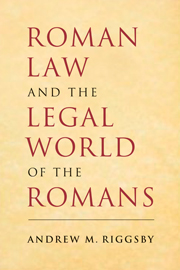Book contents
- Frontmatter
- Contents
- ROMAN LAW AND THE LEGAL WORLD OF THE ROMANS
- 1 Introduction
- 2 Roman History – The Brief Version
- 3 Sources of Roman Law
- 4 Sources for Roman Law
- 5 The Legal Professions
- 6 Legal Education
- 7 Social Control
- 8 Legal (In)equality
- 9 Writing and the Law
- 10 Status
- 11 Civil Procedure
- 12 Contracts
- 13 Ownership and Possession
- 14 Other Rights over Property
- 15 Inheritance
- 16 Women and Property
- 17 Family Law
- 18 Delict
- 19 Crimes and Punishments
- 20 Religious Law
- 21 Law in the Provinces
- 22 Conclusion
- Documents
- Glossary
- Further Reading
- Index
8 - Legal (In)equality
Published online by Cambridge University Press: 05 June 2012
- Frontmatter
- Contents
- ROMAN LAW AND THE LEGAL WORLD OF THE ROMANS
- 1 Introduction
- 2 Roman History – The Brief Version
- 3 Sources of Roman Law
- 4 Sources for Roman Law
- 5 The Legal Professions
- 6 Legal Education
- 7 Social Control
- 8 Legal (In)equality
- 9 Writing and the Law
- 10 Status
- 11 Civil Procedure
- 12 Contracts
- 13 Ownership and Possession
- 14 Other Rights over Property
- 15 Inheritance
- 16 Women and Property
- 17 Family Law
- 18 Delict
- 19 Crimes and Punishments
- 20 Religious Law
- 21 Law in the Provinces
- 22 Conclusion
- Documents
- Glossary
- Further Reading
- Index
Summary
The american declaration of Independence asserts that “all men are created equal.” Similar ideas have led most modern legal systems to the ideal (not always lived up to) of equal treatment by the law. Roman society, by contrast, took for granted the idea that different people had different value. Consequently, the Roman legal system recognized or created a variety of inequalities. Most of these are described elsewhere in this book (especially in Chapter 10), but a brief summary in one place will be in order. Women were under restrictions that did not apply to men. Younger and younger children had progressively fewer rights. For political reasons, some people were free (including ex-slaves) and some enslaved. Among the free people, different ones were citizens of different communities. All of these distinctions produced different sets of rights. The blind and the deaf were also restricted, as were the “insane.” The wealthy had explicit political privileges, though generally not legal ones. Magistrates did have some legal advantages. Starting from the first century ad, there was a more lenient bankruptcy procedure available to “notable” persons. There is even some evidence that the praetor might (sometimes) simply refuse to grant actions against a more powerful person by a less powerful one. But despite all this, Roman law remained surprisingly egalitarian in certain theoretical respects. To simplify the situation slightly, the factors just listed all affect what questions had to be answered in court, but should not affect a trial once under way.
- Type
- Chapter
- Information
- Roman Law and the Legal World of the Romans , pp. 77 - 86Publisher: Cambridge University PressPrint publication year: 2010



